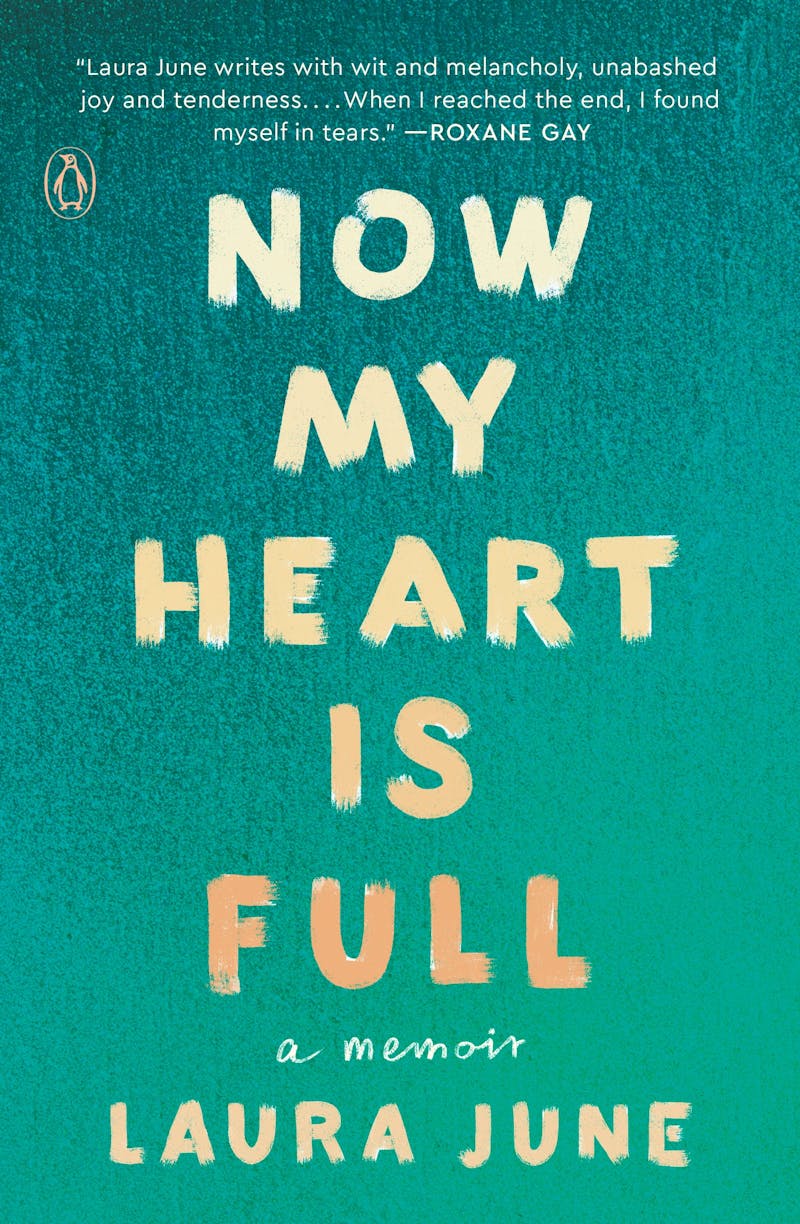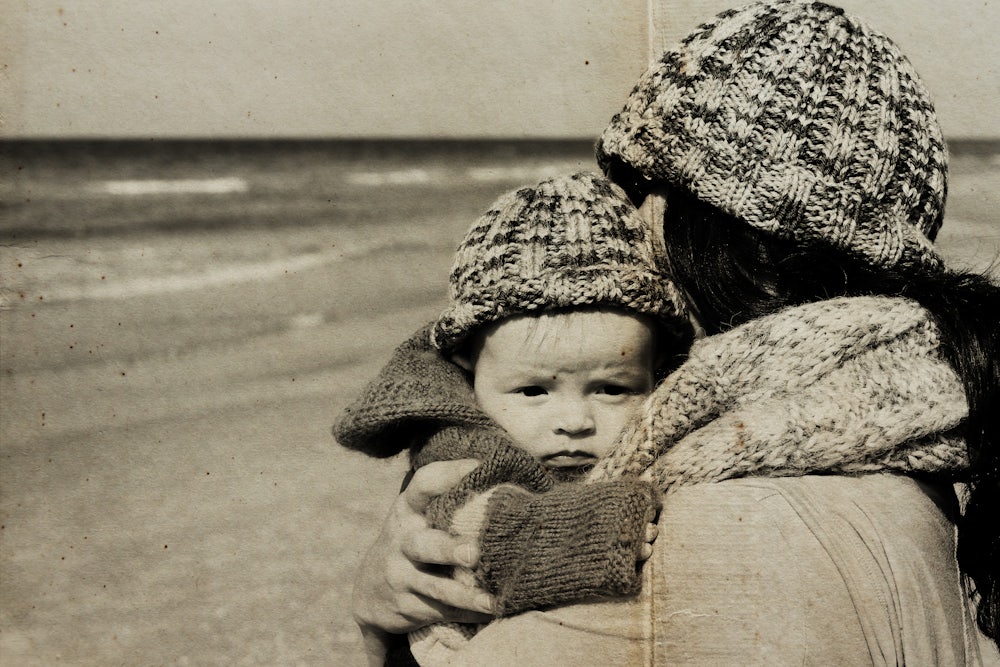As vocations go, none is so venerated and simultaneously disdained as motherhood. Fraught with essentialized and limiting views of femininity, being a mother often entails demanding recognition for one’s labor while resisting conflation with it. Even as more mothers run for office and take executive positions, countless others are regularly passed over for promotions, based on the assumption that motherhood has whittled down their non-domestic ambitions. It can be nearly as complicated to have a mother as to be one. Every Mother’s Day, those of us who have lost our maternal figures face shrieking pastel reminders of our grief, while those who grew up with abusive or absent mothers are shunted to the side. Our ideals of motherhood both heave with contradictions and lack room for ambiguity.

These are just some of the reasons that Laura June’s joyful, empathic, but uncompromisingly irreverent memoir, Now My Heart Is Full, is such a balm, whether one regards parenthood with clear-eyed enthusiasm or with leery ambivalence. Intertwining her experience of becoming a mother with the memories of her own, late mother, June reckons unflinchingly with the muck of motherhood and daughterhood without disavowing the precious particularities of both. Her book is less preoccupied than other recent works (Sheila Heti’s Motherhood, Rivka Galchen’s Little Labors) with the disquietude inherent to choosing parenthood or with the agitated reconceiving of identity once she has become one; through the tapestry of memory, she tries to forge a new, more capacious narrative for her experiences of motherhood, one that situates pain and pleasure alongside one another, where they neither compete nor cancel each other out.
Her story begins in 1995, during her senior year of high school when she discovered that she was pregnant. After some contemplation, she decided to have an abortion—a choice fully supported and facilitated by her Catholic mother. In fact, when June asks for advice, her mother firmly sets the tone of their conversation by affirming her daughter’s autonomy. She asks June what she wants to do, and, after oscillating and taking stock of her circumstances, June calls Planned Parenthood. “[There’s] no doubt that this act, enabled by my mother,” she writes, “is the single most important thing to have happened to me.” Terminating a pregnancy is a portentous decision—June makes no bones about that—but it need not become a cross to bear. On the contrary, it can be a deliverance all of its own, a threshold leading to something else, perhaps something better.
After terminating her pregnancy, June graduates from high school and proceeds, somewhat haltingly, from college to graduate school. In unexpected circumstances, she meets the person she will eventually marry, and who will become the father of her child. Did her abortion ensure a better future? She doesn’t say, and resists contemplating an alternative path—what might have been. Instead, her memoir nimbly laces together the yen for a legible history with the uncompromising assertion that we can only own the choices we make. And even then, we have to contend with the fissures and contingencies. There is an unyielding chasm between the desires that shape the plans we make and the options that are, ultimately, available to us.
Pregnancy compelled June to question her own narrative and how much control she’d been able to have over it. Although she had planned to deliver her daughter, Zelda June, without medicinal intervention, the safest method for her was Caesarian section—a procedure often bemoaned as a worse-case scenario, as if the delivery of a baby were somehow diminished or rendered “unnatural” through surgery. “Natural as opposed to…what?” June demands, illuminating the word’s own socially manufactured meaning. After all, Zelda came into the world with relative ease and in health. Moreover, the surgery didn’t put June in danger: “What more could a mother ask for?” she remarks. “An unnatural, beautiful birth.”
Accordingly, she possesses little patience for those who purse their lips or offer sympathy at the mention of a C-section. “When people ask if I was disappointed by my birth experience, I want to tell them to fuck off,” June writes. “I want to scream at them and tell them they’re terrible people who don’t know anything, that they’re one step away from vaccine deniers. Instead I just say, ‘No. Were you?’” With this breezy, defiant attitude—towards her Caesarian section, towards her decision to feed her daughter formula—June doesn’t scoff at the complications of motherhood or the issues of identity tethered to it, but rather gives us permission to set them aside. Agonizing over how to be a mother—this may be relatively unavoidable, but anguish doesn’t need to characterize maternity. What’s more, we’re not obligated to suffer the passive aggressive culture of competitive parenting with submissive politesse. We can set the course of our own battles, and we can vanquish our doubts on our own terms.
June strives for a similar equilibrium as she contends with memories of her own mother: to honor and accept the memories that comprise her own story even when they are unchangeable, and sometimes bitterly tragic. Laura June’s mother, Kathleen June, died in 2007, several years before the birth of her granddaughter, after decades of acute alcoholism. “I loved her so much,” Laura June tells her readers, “but she was my greatest—really my only—source of pain.” Aware of her mother’s illness from early childhood, Laura June brooked the emotional whiplash that so often attends alcoholic parenting: She shared a deep intimacy with her mother, who in turn was nurturing and open-hearted—until, after a bout of drinking, she wasn’t:
This dissonance—that my sober mother loved me very much, that she braided my hair and sang to me, bought me little matching jumpers and sock sets, and made sure I was inoculated and had a lunch packed with little love notes in pen on the napkin tucked inside but then forgot to even bother picking me up occasionally, with barely a nod in my direction in apology after the fact—that I began to experience, where suddenly I wasn’t first on her list but now seemed last, was quite confusing. Years later, it was still hurtful, and even now as I sit here typing I feel overwhelming sadness for the eight-year-old me…all the other kids filing out with their mothers, me just standing there, getting more nervous by the second.
Years of this domestic volatility weighed heavily on June. She eventually left home at the age of 18, and over the next decade, the relationship between mother and daughter thinned, as June established boundaries to safeguard her own welfare. They spoke for the last time when, in 2005, June left her hometown outside Pittsburgh, Pennsylvania to live in in Brooklyn with her husband. She returned home two years later, after her mother was hospitalized, in order to join her siblings in making the impossible and wretched decision to cease life support.
As June observes, her mother died before her own life gained momentum. She married in October 2007, began a career as a writer, and gave birth to a daughter in February 2014. And on that first foggy day of motherhood, a feeling, not wholly unsurprising, reared its head. “I wanted my mother,” Laura June writes. “Not for guidance or even support, but simply for her to be there.” The experience of giving birth, so often rendered as a moment out of time, transforms into an event impossibly, painfully, intertwined with one’s own history. Motherhood, however it may direct our gaze towards the future, will inevitably connect to the past and to what we have have lost.
I came to Laura June’s book not as a mother, but as someone who is raw from her own unmothering: My mother, who, like June’s mother, was called Kathy, died in November 2017 after three and a half years bearing the ravages of metastatic ovarian cancer. When it was clear that she wouldn’t live much longer, I recalled an image—a fantasy—that I had long nurtured of a hypothetical, but already dearly beloved trio: my hoped-for newborn, my own mother, and me, united by precious, certain proximity. Realizing that whatever the future held, I now harbored my own “very normal but impossible wish,” I’ve since attempted to suppress it with positively no success.
I don’t pretend that this desire can be assuaged, or that I expect to ever mourn my mother less, but June understands something that I didn’t until I read her book—that death does not necessarily condemn a relationship to stasis. “And though much in my life has changed in the decade since she died, nothing has changed as much as my relationship with her,” June writes. “And in some ways, her dying led me here: the space she left behind opened a new place for me to make new thing; happier things and, in many ways, better ones.” Each new, flourishing relationship casts the previous ones in new, more varied and pacific hues. Memories of remarks made in passing assume a different, more consequential valence. The long-throbbing aches from past discords may not fully dissipate—but sometimes we find new ways to bear grief when our prospects shift.
Now My Heart Is Full doesn’t debate the pros and cons of having children, or take on the futile task of defining a mother’s role. Instead it offers tender ambiguity, indicating that something as overdetermined as a “mother” can never mean precisely what we want or expect or fit the contours of our fluctuating hopes. It can be difficult to know what you want, or what to ask for, until you detect that pang—something lost before it had been discerned. I couldn’t know what I would want from my mother until she was no longer here to provide it. But like Laura June, I’m taking stock. Inheritances are built when we know what we miss.
